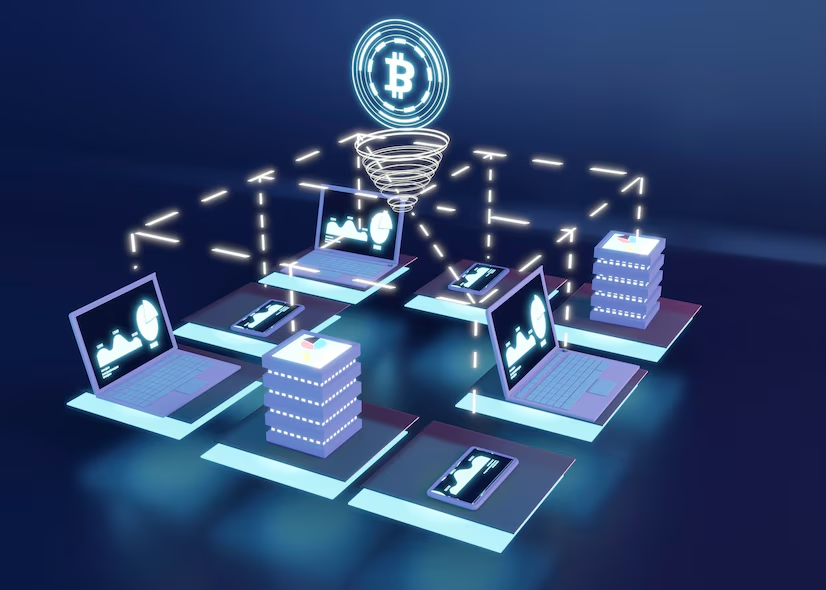Blockchain and Web 3.0 Tech to Simplify and Supercharge Your Business
Decentralized Applications (DApps)
Blockchain and Web 3.0 enable the development of decentralized applications that operate on peer-to-peer networks. These DApps are more secure, transparent, and resistant to censorship, providing innovative solutions across various industries.

Smart Contracts
Smart contracts are self-executing contracts with the terms of the agreement directly written into code. They automatically enforce and verify the terms, reducing the need for intermediaries and enhancing the efficiency and security of transactions.

Digital Identity
Blockchain technology ensures secure and immutable digital identities. Users can have greater control over their personal data, reducing the risk of identity theft and fraud while enhancing privacy and security.

Supply Chain Transparency
Blockchain provides transparency and traceability in supply chains. It allows businesses to track products from origin to delivery, ensuring authenticity, reducing fraud, and enhancing efficiency in the supply chain.

Decentralized Finance (DeFi)
Decentralized Finance (DeFi) leverages blockchain to offer financial services without traditional intermediaries. This includes lending, borrowing, trading, and investing in a decentralized manner, making financial services more accessible and transparent.

Data Ownership and Privacy
Web 3.0 empowers users by giving them ownership and control over their data. Blockchain technology ensures that data is stored securely and transparently, allowing users to decide how their information is shared and used.

Decentralized Applications (DApps)
Blockchain and Web 3.0 enable the development of decentralized applications that operate on peer-to-peer networks. These DApps are more secure, transparent, and resistant to censorship, providing innovative solutions across various industries.
Smart Contracts
Smart contracts are self-executing contracts with the terms of the agreement directly written into code. They automatically enforce and verify the terms, reducing the need for intermediaries and enhancing the efficiency and security of transactions.
Digital Identity
Blockchain technology ensures secure and immutable digital identities. Users can have greater control over their personal data, reducing the risk of identity theft and fraud while enhancing privacy and security.
Supply Chain Transparency
Blockchain provides transparency and traceability in supply chains. It allows businesses to track products from origin to delivery, ensuring authenticity, reducing fraud, and enhancing efficiency in the supply chain.
Decentralized Finance (DeFi)
Decentralized Finance (DeFi) leverages blockchain to offer financial services without traditional intermediaries. This includes lending, borrowing, trading, and investing in a decentralized manner, making financial services more accessible and transparent.
Data Ownership and Privacy
Web 3.0 empowers users by giving them ownership and control over their data. Blockchain technology ensures that data is stored securely and transparently, allowing users to decide how their information is shared and used.
Cyber Security Risk Management
Cyber threats evolve rapidly, risking businesses of all sizes. Cybersecurity Risk Management identifies, assesses, and mitigates these risks, protecting your sensitive information, reputation, and bottom line.
Comprehensive Network Infrastructure Solutions to Protect and Empower Your Business
Cyber Security Risk Management
Cyber threats evolve rapidly, risking businesses of all sizes. Cybersecurity Risk Management identifies, assesses, and mitigates these risks, protecting your sensitive information, reputation, and bottom line.
Cyber Security Risk Management
Cyber threats evolve rapidly, risking businesses of all sizes. Cybersecurity Risk Management identifies, assesses, and mitigates these risks, protecting your sensitive information, reputation, and bottom line.
Cyber Security Risk Management
Cyber threats evolve rapidly, risking businesses of all sizes. Cybersecurity Risk Management identifies, assesses, and mitigates these risks, protecting your sensitive information, reputation, and bottom line.
Cyber Security Risk Management
Cyber threats evolve rapidly, risking businesses of all sizes. Cybersecurity Risk Management identifies, assesses, and mitigates these risks, protecting your sensitive information, reputation, and bottom line.
Cyber Security Risk Management
Cyber threats evolve rapidly, risking businesses of all sizes. Cybersecurity Risk Management identifies, assesses, and mitigates these risks, protecting your sensitive information, reputation, and bottom line.
Cyber Security Risk Management
Cyber threats evolve rapidly, risking businesses of all sizes. Cybersecurity Risk Management identifies, assesses, and mitigates these risks, protecting your sensitive information, reputation, and bottom line.

